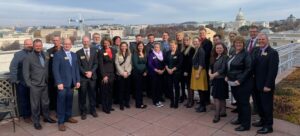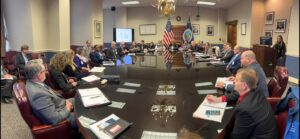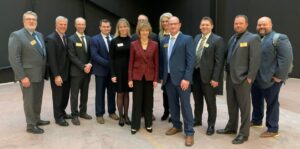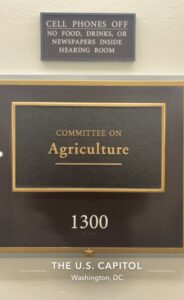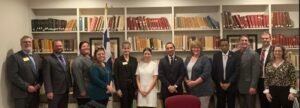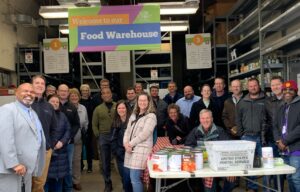For the policy geeks, the history buffs, and the 10,000 steps-a-day devotees, the first day of MARL Seminar 7 had something to offer everyone!
Class XII kicked off our week in Washington, D.C. at the American Farm Bureau Federation, where we learned about the “grassroots to grasstops” lobbying process from Ryan Yates, AFBF Managing Director of Government Affairs. Ryan and his colleagues discussed Farm Bureau’s work at the national level and emphasized the importance of being an effective ag advocate and educator. Ryan noted that since nearly half of current Congress members were not in office during the last Farm Bill, these efforts are critical to a favorable, bipartisan resolution.
Veronica Nigh, AFBF Economist, presented 2023 statistics on inflation, farm income, unemployment rates, and wages. She discussed how these figures might be interpreted at state and national levels when making ag and rural policy decisions.
Elise Cruce, Director of Leadership Development, talked through strategies for fostering better conversations about agriculture with individuals and organizations who have misunderstandings or opposing views. Research shows that about 70% of Americans trust “farmers,” but when asked if they trust “farming,” the number drops significantly. She emphasized the importance of not just “sharing our story,” but emphasizing common values rather than hard facts, and seeking to understand a point of view rather than prove or disprove it to foster greater curiosity and trust. Mark Rokala reiterated and agreed with everyone else who spoke before him. He emphasized focusing on policy and not politics and always ending with “thank you” and “what can I do to help you?”
Our next visit was at the Department of Agriculture, where we met with members of the USDA Foreign Agricultural Service. After a warm welcome from program administrator Daniel Whitley, we heard from Julio Maldonado, Global Engagement Executive, and Chris Swenson from Legislative Affairs. They discussed the four pillars of FAS’s work, which include: Trade Policy (expanding and maintaining access for US ag products); Trade Promotion (marketing development and organizing trade shows); Capacity Building (help countries build trade capacity with US, develop non-emergency food programs); and Data Analysis (global market research, production forecasting, monitor changes in trade policies). Because agricultural commodities are so globalized, it is critical that the US positively engage with other countries to promote our products and practices. Conversely, it is also important to keep Congress informed about how national policy decisions could affect US ag and trade interests worldwide.
Later in the afternoon, our group split off to meet with Tom Liepold and Adam Schiff, staffers for Senators Amy Klobuchar and Tina Smith, respectively. Rather than talk politics, we picked their brains about policy development and leadership. Yet again, our hosts shared that agreeing on a Farm Bill that is favorable to both agriculture and nutrition programs is something that makes them lose sleep at night. They surmised that the middle 80% of Congress could likely achieve compromise, but the extreme 20% of the right and left make collaboration difficult. When asked about what makes a good leader, Tom said that the best Congressmen and women are often curious and willing to learn about issues they don’t understand and to meet with those who disagree with them.
Tuesday: December 5, 2023
The MARL group started off Tuesday with a visit to the Longworth House Office Building where we met with the House Committee on Agriculture. We were able to discuss the current Farm Bill, along with the current extension and dive a little deeper into the multiple hurdles that will be faced in 2024. Passed every five years, the farm bill costs about a half-trillion dollars and funds farm subsidies, crop insurance, nutrition assistance, conservation programs, and more. Without the extension, some farm programs would have expired at the end of the year. This extension includes funding through next September for farm programs and food assistance. The U.S. Congress is working to draft a new, 5-year Farm bill with congressional hearings underway to determine public and private stakeholders’ priorities for the reauthorization.
The MARL class split up Tuesday afternoon and colleagues were able to meet with their local representatives and discuss pertinent information regarding local issues. Here, we were able to build and strengthen relationships and share our invitations of support for Minnesota agriculture.

That evening the MARL class travels to the United States Holocaust Memorial Museum. The United States Holocaust Memorial Museum is America’s national institution for the documentation, study, and interpretation of Holocaust history, and serves as this country’s memorial to the millions of people murdered during the Holocaust. The Holocaust was the state-sponsored, systematic persecution and annihilation of European Jewry by Nazi Germany and its collaborators between 1933 and 1945. Jews were the primary victims—six million were murdered; Roma, people with disabilities and Poles were also targeted for destruction or decimation for racial, ethnic, or national reasons. The Museum’s primary mission is to advance and disseminate knowledge about this unprecedented tragedy; to preserve the memory of those who suffered; and to encourage its visitors to reflect upon the moral and spiritual questions raised by the events of the Holocaust as well as their own responsibilities as citizens of a democracy.
Wednesday: December 6, 2023
Wednesday morning the MARL group traveled to The Climate Reality Project. Former Vice President Al Gore is the founder and chairman of The Climate Reality Project. The Climate Reality Project is focused on climate change education and advocating for climate solutions available today. The organization is a consolidation of two environmental organizations, the Alliance for Climate Protection and the Climate Project, both founded in 2006 by the latter. The Climate Project is an educational, worldwide grassroots organization that trained selected members of the public to give public talks, similar to Gore’s presentation in the film, “An Inconvenient Truth.” These discussions focus on the harmful effects of climate change and ways to address climate change at the grassroots level.
Wednesday afternoon the MARL group split up again into Leadership Groups and attended various Professional visits. One group was able to meet with The Embassy of Panama in anticipation of the MARL International Seminar that will be hosted in Panama in February! We were able to discuss our itinerary and learn some wonderful information about Panama that will help the group prepare.
After the Professional visits, Leadership groups were able to have some “free time” together and work on Leadership Search Activity. Different visits including, walking tours in the “Speak- Easy”, trolley tours throughout the town, a trip to the National Archives, as well as the Natural History Museum. After these activities, the MARL class traveled to Alexandria, Virginia, for our farewell dinner at the Historical, Gadsby’s Tavern. The leadership groups were focused on creating a “message in a bottle” where we were able to identify examples of leadership and how we can apply these in our professional and personal life.
Thursday: Final Day
No better way to end our week in DC then doing some community outreach. We had the opportunity to visit So Others Might Eat (SOME). What a humbling experience to learn what SOME truly is. They are so much more than the typical food pantry that we all think about. SOME has a business model of serving the Columbia District in DC for six decades. They started serving meals in April 1970 and have never missed a day since. Yes, that is 365 days a year for 53 years!
Class XII got to meet with President/CEO, Ralph Boyd, EVP Chief Strategy and Performance Officer, Stephanie Brown, VP Customer Relationship Management/CQI, Dirk Keaton, and SVP Community Outreach, Daryl Wright. We learned that SOME employs 400 team members plus has numerous volunteers that support their business. SOME has 9 service lines providing housing, food, health services, etc. for those in need. They have an almost $1B fair market value balance which includes 1,350 units of affordable housing. One key to SOME’s success is having a no barrier dining room. This means anyone can get a meal with no questions asked & no ID necessary. Daryl, also known as the “Mayor”, mentioned that DC has 8-12,000 invisible homeless people which they provide support for. He challenged us to show up & volunteer. Volunteer services provides hope for a better future for those in need. A piece of leadership advice that Ralph left us with was as a leader we don’t need to be the smartest person in the room. Rather we need to find smart team members and empower them to do their best. We ended our time at SOME helping move some hygiene care packages around for them to set up for a large delivery the next day.
After our visit at SOME we debriefed at the hotel. Everyone created a souvenir of their experience this week in DC. Each of us are challenged to think about what’s next. We will continue to take our experiences to learn from and take action.
Blue SMT Group- Sagan King, Dan Kuhns, Katie Covino, Courtney Duncanson, Sue Gorman
